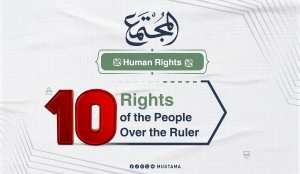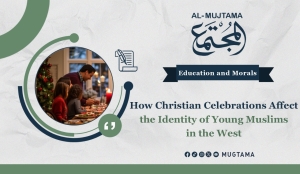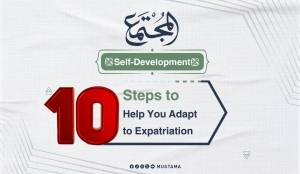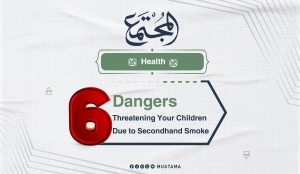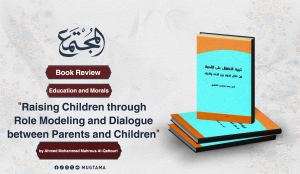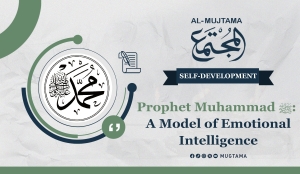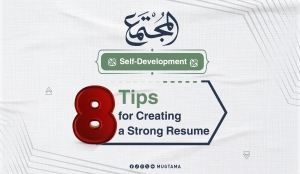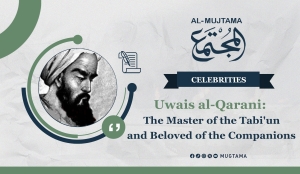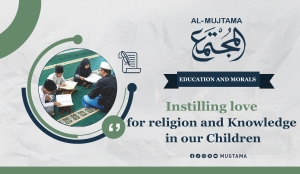Hadeel
10 Rights of the People Over the Ruler
December 25, 2024Islamic Sharia policy has diligently clarified the rights and duties of both the ruler and the ruled, ensuring their fulfillment to achieve the welfare of the people. Among the rights of the people upon their ruler are the following:
1. Safeguarding Religion and Governing the World Through It
This entails establishing religious practices, facilitating their proper observance, and implementing Allah's commands in all aspects of life. Allah says: “[And they are] those who, if We give them authority in the land, establish prayer and give zakah and enjoin what is right and forbid what is wrong. And to Allah belongs the outcome of [all] matters” (Al-Hajj: 41).
Jurists have emphasized that leadership is established to succeed prophethood in safeguarding religion and governing worldly affairs through it. (1)
2. Upholding Justice and Truth
Islam obligates rulers to uphold justice and truth among people, regardless of their wealth, status, or relationship. Allah says: “O you who have believed, be persistently standing firm for Allah, witnesses in justice, and do not let the hatred of a people prevent you from being just. Be just; that is nearer to righteousness. And fear Allah; indeed, Allah is Acquainted with what you do” (Al-Ma’idah: 8).
The first Caliph, Abu Bakr As-Siddiq, exemplified this when he declared in his inaugural address: "O people, I have been appointed over you, though I am not the best among you. If I do good, help me; and if I act wrongly, correct me. The weak among you is strong before me until I return to them their rights, Allah willing. And the strong among you is weak before me until I take from them what is due, Allah willing. Obey me as long as I obey Allah and His Messenger, but if I disobey Allah and His Messenger, then I have no right to your obedience." (2)
Rulers are expected to legislate just laws and implement fair judgments between disputing parties.
3. Ensuring the Welfare of the People
The ruler is responsible for the well-being of their subjects, striving to elevate them and provide a decent life for them, for Allah will hold them accountable. The Prophet ﷺ said: "All of you are guardians and are responsible for your wards. The ruler is a guardian and responsible for his subjects; the man is a guardian and responsible for his family; the woman is a guardian and is responsible for her husbands house and his offspring; and so all of you are guardians and are responsible for your wards." (Bukhari and Muslim).
The second Caliph, Umar ibn Al-Khattab, said: "If a lamb were to perish on the banks of the Euphrates, I would fear that Allah would hold me accountable for it." (3)
4. Defending the Country
The ruler must prepare to protect the citizens and defend the state and religion by equipping armies and fortifying borders. Allah says: “And prepare against them whatever you are able of power and of steeds of war by which you may terrify the enemy of Allah and your enemy” (Al-Anfal: 60).
While military power ensures security, the ruler is also responsible for developing other forces, such as knowledge, industry, and commerce, which contribute to the nation's strength.
5. Avoiding Betrayal of Trust
Responsibility is a trust that requires fulfilling Allah's commands. Abu Dhar asked the Prophet ﷺ “Why do you not appoint me to an (official) position?” The Prophet ﷺ patted him on the shoulder with his hand and said, "O Abu Dharr, you are a weak man and it is a trust and it will be a cause of disgrace and remorse on the Day of Resurrection except for the one who takes it up with a full sense of responsibility and fulfills what is entrusted to him (discharges its obligations efficiently)." (Muslim).
If a ruler neglects their duties or favors some over others unjustly, they betray this trust. The Prophet ﷺ warned: "Any governor in charge of Muslim subjects who dies while acting dishonestly towards them will be excluded by Allah from Paradise " (Bukhari and Muslim).
6. Caring for the People's Rights Personally
The leader is obligated to look after the affairs of the people, oversee their needs, inquire about their welfare, and either attend to their needs personally or entrust this responsibility to trustworthy and competent individuals. The leader must also provide accessible means for people to convey their suggestions or grievances. In a hadith, Amr bin Murrah al-Juhani reported that the Messenger of Allah (peace be upon him) said: "No Imam closes his door on one in need, dire straits and poverty, except that Allah closes the gates of the Heavens from his dire straits, his needs, and his poverty." (4) (Sunan Abi Dawood, 2858)
7. Kindness Towards the People
Islam emphasizes kindness towards the people. Imam Muslim narrates from Aisha, the Mother of the Believers, that the Prophet ﷺ said: "O God, cause distress to him who has any charge over my people and causes them distress, and be gentle to him who has any charge over my people and is gentle to them."
In another narration from Muslim, it is reported that the Companion Aaidh ibn Amr (may Allah be pleased with him), who was among the Companions of the Messenger of Allah, visited Ubaydullah ibn Ziyad. He addressed him, saying: " Dear son, I heard Messenger of Allah ﷺ saying: "The worst of rulers are those who treat their subjects harshly. Beware, lest you should be one of them."
This was a gentle yet firm reminder to warn the leader against tyranny and encourage kindness and wisdom in governance.
8. Declaring the Policies
A leader should not hide his methods or system of governance. Instead, he should openly declare them, informing the people of their obligations and his commitments to them. The Prophet ﷺ set a clear example. In Sahih al-Bukhari, Aisha (may Allah be pleased with her) narrated the story of the Quraysh being concerned about the punishment for a noblewoman who had committed theft. They asked Usamah bin Zaid to intercede with the Prophet ﷺ, but he responded: "Are you interceding regarding one of the punishments prescribed by Allah?" He then got up and delivered an address in which he said, "Indeed what destroyed the people before you was just that when a person of high rank among them committed a theft, they spared him; but if the same crime was done by a poor person they inflicted the prescribed punishment on him. I swear by Allah that if Fatimah daughter of Muhammad should steal, I would have her hand cut off."
Similarly, Abu Bakr (may Allah be pleased with him) delivered a powerful address upon assuming the caliphate, stating: "O people, I have been appointed over you, though I am not the best among you. If I do well, help me; if I do wrong, correct me. The weak among you are strong to me until I return their rights to them, Allah willing. The strong among you are weak to me until I take the rights from them, Allah willing. Obey me as long as I obey Allah and His Messenger; but if I disobey Allah and His Messenger, you owe me no obedience." (5)
9. Managing Financial Affairs
The financial policies of the state, which encompass its resources and expenditures, are a trust that must be fulfilled appropriately. Allah says: "Indeed, Allah commands you to render trusts to whom they are due." (An-Nisa: 4:58)
The leader must meticulously organize financial matters, ensuring that everyone's rights are fulfilled. Likewise, the citizens must fulfill their financial obligations to the state, cooperating in this regard. Allah says: "And cooperate in righteousness and piety, but do not cooperate in sin and aggression." (Al-Ma'idah: 2)
The Prophet ﷺ urged people to fulfill their financial duties. In Sahih al-Bukhari and Muslim, Abu Hurairah narrated that the Prophet ﷺ said: "Give them their due rights, for Allah will question them about what He asked them to guard." In Sahih al-Bukhari and Muslim, it is also narrated from Abdullah ibn Mas'ud that the Messenger of Allah ﷺ said: "Soon others will be preferred to you, and there will be things which you will not like." They asked, "O Allah's Messenger ﷺ! What do you order us to do (in this case)?" He said: "(I order you) to give the rights that are on you and to ask your rights from Allah."
The leader is also responsible for being honest in financial distributions, closely monitoring and following up with his administrators, as Allah will hold him accountable. In Sahih al-Bukhari, the Prophet ﷺ said: "What I give you and do not withhold from you I am just distributing, putting it where I have been commanded."
10. Choosing the Right Officials
Appointing government officials is a significant trust. The leader must select competent and righteous individuals. If a leader finds such people, it is a sign of Allah’s favor upon him. In Sahih Ibn Hibban, Aisha (may Allah be pleased with her) reported that the Prophet ﷺ said: "When God has a good purpose for a ruler He appoints for him a sincere minister who reminds him if he forgets and helps him if he remembers; but when God has a different purpose from that for him He appoints for him an evil minister who does not remind him if he forgets and does not help him if he remembers."
In Hilyat al-Awliya’, it is narrated that Umar ibn Abdul Aziz said: "If you see me deviating from the truth, grab me by the collar and shake me, and say, 'What are you doing, Umar?'” (6)
This highlights the importance of choosing trustworthy and righteous officials to assist in governance and ensure the proper management of public affairs.
-------------------------------------------------------------
- Al-Ahkam al-Sultaniyyah wa al-Wilayat al-Diniyyah by Al-Mawardi, p. 5.
- Al-Bidayah wa al-Nihayah by Ibn Kathir, vol. 8, p. 89.
- Musannaf Ibn Abi Shaybah, with a sound chain of narration (37205).
- Narrated by Abu Dawood (2948), Al-Tirmidhi (1332), and Ahmad (18033).
- Al-Bidayah wa al-Nihayah by Ibn Kathir, vol. 8, p. 89.
- Hilyat al-Awliya’ wa Tabaqat al-Asfiya’ by Abu Nu`aym al-Asbahani, vol. 5, p. 292.
In a world flooded with cultural openness and societal diversity, Muslim families in the West face significant challenges in safeguarding their Islamic identity and religious traditions, especially during seasons and celebrations with differing religious themes. A vivid example of this struggle can be seen in Muslim mothers living abroad, some of whom have turned to social media to share their challenges in raising children on Islamic values while continuously confronting Western cultural influences.
As mid-December approaches, stores and markets begin to showcase various products in colors associated with Christmas, such as red, green, and gold, accompanied by enticing seasonal offers. Around this time, decorations and lights adorn hotels, malls, and homes, captivating adults and children alike. Sadly, even some channels in Islamic countries—may Allah guide them—speak about Christmas and New Year’s Eve as if these occasions are their own. Within this context, some mothers find themselves perplexed, wondering: What is the appropriate stance to take regarding what our children see, in a manner that aligns with Islamic principles and is suitable both religiously and educationally? How can we convince them not to be drawn into celebrating like the majority around them?
In one mother’s account, she discusses the position on celebrating Christmas and how the Muslim community in Britain is divided between conflicting views. Some partake in the celebrations and offer gifts to their children, while others adamantly reject this stance to preserve their Islamic identity.
This mother believes the solution lies not in outright rejection or full participation but in balance, providing explanations and educating children in a simplified manner, supported by Islamic values. To her, it is crucial for children to understand the concept of religious and cultural differences, to respect others while maintaining their own identity.
Undoubtedly, these challenges require awareness and a balanced approach by parents, as it is neither feasible to deny the reality of integration and interaction with surrounding communities nor permissible to compromise on preserving religious values and identity.
Muslim parents must understand why celebrating non-Islamic holidays is forbidden. When we prevent our children from celebrating and participating in the rituals of such occasions, we strive to comply with Allah’s commands: “That [is so]. And whoever honors the symbols of Allah - indeed, it is from the piety of hearts.” (Al-Hajj 32). Those who obey Allah’s command and honor religious symbols are described as having hearts characterized by piety and fear of Allah.
Additionally, by abstaining from these celebrations, we follow the Sunnah of our Prophet Muhammad ﷺ, avoiding imitation of the disbelievers. The Prophet ﷺ said, “He who copies any people is one of them.” (Ahmad).
It is also essential for children to learn from a young age that Muslims only have two celebrations: Eid al-Fitr and Eid al-Adha, along with the weekly celebration of Friday (Jumu'ah). Any other celebration falls into one of two categories: innovation (if the celebration is considered an act of worship, like Mawlid), or imitation of non-Muslims (if celebrated as a cultural tradition). Anas ibn Malik narrated that when the Prophet ﷺ arrived in Medina, the people had two days on which they engaged in games. He asked, “What are these two days (what is the significance)?” They replied, “We used to engage ourselves on them in the pre-Islamic period.” The Prophet ﷺ said, “Allah has substituted for them something better than them, the day of sacrifice and the day of the breaking of the fast.” (Ahmad, Abu Dawood, and Nasa'i with a sound chain).
What also prevents us from celebrating is the importance of preserving our Islamic identity. It is disheartening to see many people today melting into Western culture, influenced by imported customs, even when they conflict with our religion and core traditions. Such leniency and lack of firmness lead to the erosion and eventual disappearance of Islamic identity.
How to Address Christmas with Our Children Educatively?
1. Teach the Story of Prophet Isa (Jesus, peace be upon him): Explain who Prophet Isa (peace be upon him) is, his story, and what Muslims believe about him. Compare the beliefs of Ahl al-Sunnah wal-Jama’ah with those of Christians regarding Isa (peace be upon him).
2. Engage in Dialogue with Children: When speaking with young children, do not simply say, “Christmas is haram,” without elaboration. Children under six may not grasp the meaning of "haram." Instead, explain that a "kafir" is someone who denies and fails to acknowledge Allah’s blessings. Allah created and provided for him, granting him the means to enjoy the good things in life and worship Him as prescribed through His messengers, but he rejects this and suffers loss.
3. Clarify the Meaning of Christmas: Explain that Christmas celebrates the birth of Jesus, whom Christians regard as either God or the son of God, which contradicts our beliefs as Muslims. We believe that Isa (peace be upon him) was only a messenger sent by Allah with the Injil (Gospel).
4. Discuss who is Santa Claus: Explain that Santa Claus is a symbol rooted in the story of a monk named Nicholas, who dedicated himself to spreading Christianity among Roman children by distributing sweets and gifts. This concept challenges our Islamic belief system.
5. Make Muslim Celebrations Attractive: To encourage children, ensure that Islamic celebrations are exciting and memorable. Just as children see their peers from other faiths celebrating with joy, Muslim children should feel pride and happiness in their own celebrations.
How Should a Muslim Respond to “Merry Christmas”?
The correct response is not to reply at all, as congratulating them on such occasions is forbidden. Whether they are colleagues or not, we should not respond to their greetings, as these are not our holidays, and they are displeasing to Allah. As Sheikh Ibn Uthaymeen (may Allah have mercy on him) said when asked about the ruling on congratulating disbelievers on their holidays, “It is not permissible.”
When children see their parents adhering to Allah’s commands and honoring His symbols, their fascination with non-Muslim celebrations will diminish. They will feel comfortable embracing their differences and refraining from participation in such festivities, even proudly explaining their Islamic beliefs to friends and teachers. For instance, just as Muslims do not celebrate Christmas or receive gifts, their non-Muslim friends do not celebrate Ramadan or receive gifts during Eid.
Finally, we ask Allah to guide our children to what is best for them in this world and the hereafter, to show them the truth and enable them to follow it, and to protect them from falsehood.
10 Steps to Help You Adapt to Expatriation
December 23, 2024One may experience traveling abroad and living in a different community, especially with the increasing rates of global migration, which currently stand at approximately 281 million migrants, according to the International Organization for Migration's migration report. This situation imposes challenges on expatriates and their families due to the differences in customs and traditions between societies.
These challenges, particularly for children, include linguistic, cultural, religious, social, economic, and political difficulties. Such challenges are more pronounced when migration involves transitioning from an Arab society to a European or Western one, where differences in language and religion are significant. However, the experience may be easier when the expatriate resides in an Arab country that shares similar customs, traditions, language, and religion.
Psychologists and sociologists note that expatriates often experience feelings of isolation, and failure to adapt quickly to the new society can lead to depression. To overcome these challenges, expatriates are advised to form new friendships, engage in productive activities, strengthen their connection with Allah, and associate with pious individuals. This serves as a firm bond that helps them cope with their situation.
However, the situation becomes more complicated when expatriation is prolonged and occurs in a non-Muslim country. Here, expatriates face a struggle between integrating into the new society and maintaining their identity, especially amid increasing temptations and distractions in the host country. This issue is exacerbated for second and third-generation immigrants, who may lose their connection to their homeland and native language altogether.
The following strategies offer expatriates practical ways to adapt to life abroad, turn negative emotions into positive ones, and emerge from the expatriation experience as winners, provided they adhere to these guidelines:
1. Strengthen Connection with Mosques
Frequent visits to mosques or Islamic centers in non-Arab countries are essential. Engage in acts of worship, remembrance, and maintaining congregational prayers. Allah says: "Those who have believed and whose hearts are assured by the remembrance of Allah. Unquestionably, by the remembrance of Allah hearts are assured." (Surah Ar-Ra'd: 28).
2. Build a Social Network
Seek out Muslim families in the area, fostering relationships that reduce feelings of isolation and facilitate integration into the new society. Encourage family members to interact with families who share similar values, customs, language, and religion.
3. Prioritize Family Bonding
Strengthen familial ties by eating meals together, speaking the native language at home, and avoiding leniency in preserving cultural identity within the household. This helps prevent children from losing their identity or experiencing cultural and value disintegration.
4. Celebrate Religious Occasions
Commemorate Islamic events like the Hijra, the Prophet’s birth, Isra and Mi’raj, Ramadan, and the two Eids. These traditions nurture a strong connection between expatriates and their religion, identity, and homeland.
5. Reinforce Identity
Encourage children to watch historical and cultural documentaries that enhance their sense of belonging to their homeland. Emphasize that expatriation is a temporary phase, reinforcing their eventual return to their country.
6. Form Local Friendships
Build relationships with virtuous locals in the host country. Gradually integrate into the society while respecting cultural differences and adhering to Islamic principles and values.
7. Learn the Local Language
Ensure that both parents and children master the language of the host country to facilitate daily interactions while maintaining the use of the native language at home.
8. Understand Local Laws
Familiarize yourself with the laws and customs of the host country to avoid unintentional violations that may lead to unnecessary complications. Seek guidance from experienced expatriates to navigate the new society effectively.
9. Maintain Ties with Relatives
Among the etiquettes of an expatriate is to maintain ties with their family. As stated in the sacred hadith, the Prophet (peace and blessings be upon him) said: "I am Allah, and I am Ar-Rahman. I created the Rahim(womb), and named it after My Name. So whoever keeps good relations with it, I keep good relation with him, and whoever severs it, I am finished with him" (Al-Tirmidhi, Abu Dawood, and Ahmad). In another prophetic hadith: "He who believes in Allah and the Last Day, let him maintain good the ties of blood relationship" (Sahih al-Bukhari). The Prophet (peace be upon him) also said: "Whoever loves that he be granted more wealth and that his lease of life be prolonged then he should keep good relations with his Kith and kin" (Sahih al-Bukhari).
An expatriate should regularly communicate with their family, checking on them through audio or video calls. With the rapid advancement of communication technologies, it has become easier to stay updated on the affairs of relatives at all times. Additionally, it is essential to maintain annual visits, avoiding estrangement, harshness, or prolonged absence. Such neglect can harden the expatriate's heart, causing them to forget their homeland, sever ties with their family, and risk losing their identity and faith.
10. Engage in Da'wah
Wherever expatriates find themselves, they should strive to invite others to Islam. This commitment strengthens their faith and maintains their connection to their religion. The Prophet Muhammad (ﷺ) said to Ali (RA): "By Allah, if one man is guided on the right path (i.e. converted to Islam) through you, it would be better for you than (a great number of) red camels." (Sahih al-Bukhari). Let expatriates take inspiration from Mus'ab ibn Umair (RA), who served as Islam’s first ambassador, spreading the faith in Madinah and earning great success during his time abroad.
-------------------------------------------------------------
6 Dangers Threatening Your Children Due to Secondhand Smoke
December 22, 2024Many parents make a grave mistake when they smoke near their children and wives at home or during meals, ignoring the dangers of secondhand smoke to their health and its potential to cause serious illnesses.
A father might be a heavy smoker, consuming up to 20 cigarettes a day or more, which increases the risk of his children developing cancer, even if they have never smoked a single cigarette. This is according to a medical study published by the German Cancer Research Center.
These lines serve as a warning bell for every father about the dangers of smoking in general, and particularly inside the home and around children and the mother. This practice significantly increases health risks for everyone, passing the harm to other family members.
First: Smoking is harmful to health and a waste of money. The Prophet Muhammad (peace be upon him) warned us: "There should neither be harming (of others without cause), nor reciprocating harm (between two parties)" (Narrated by Ahmad). This principle forms the basis for prohibiting anything that harms a person, whether it be food or drink. This includes alcohol, narcotics, tobacco, hookahs, and electronic cigarettes, among other harmful substances.
It is also authentically reported that the Prophet (peace be upon him) said: "Allah hates that you engage in gossip, asking many questions about people’s affairs and wasting wealth" (Narrated by Al-Bukhari). Wasting money includes smoking, which consumed over $250 billion of the global economy in 2022. It is projected that spending on the tobacco industry worldwide will reach $287.09 billion by 2026, with an annual consumption of tobacco products nearing 5 trillion cigarettes, according to data from the "Tobacco Atlas" center.
Second: Every smoking father should know that one person dies every 4 seconds worldwide because of smoking. Fifteen people lose their lives every minute due to tobacco, and smoking was responsible for the deaths of approximately 9 million people in 2019, according to a study published in The Lancet, one of the world's leading medical journals.
A study by the German Federal Center for Health Education revealed that secondhand smoke increases children's risk of asthma, pneumonia, and bronchitis. In general, smoking causes numerous harms, including heightened risks of heart disease, strokes, lung cancer, throat and mouth cancers, gum disease, tooth decay, and even infertility.
Third: Parents must understand that children breathe more than adults, especially infants and toddlers, which raises the risks of secondhand smoke exposure due to their underdeveloped respiratory systems and immune systems. A child inhaling pollutants in a smoke-filled room for an hour is equivalent to smoking a cigarette, according to the German Press Agency (dpa).
Fourth: Some people, particularly in rural areas, mistakenly believe that smoking hookah (shisha) is less harmful than cigarettes. They ignore scientific facts showing that one session of hookah smoking equals 55 cigarettes, or approximately three packs. The World Health Organization states on its website that hookah smoke contains large amounts of toxic substances causing cancer, particularly cancers of the mouth, esophagus, and lungs, as well as possibly the stomach and bladder. There is also evidence linking hookah smoking to respiratory diseases, heart conditions, gum disease, rhinitis, and male infertility.
Fifth: A father may switch to electronic cigarettes, thinking they are less harmful. However, experts warn that e-cigarette vapor contains pollutants such as formaldehyde and acetaldehyde, which are carcinogenic. These substances not only endanger the smoker but also his children, according to Professor Hans-Jürgen Nentwich, a member of the expert committee of the German Professional Association of Pediatricians and Adolescents.
Sixth: Cold tobacco smoke, consisting of tiny particles that settle on furniture, carpets, or clothing, is equally harmful. These particles can move through air currents, posing health risks even when children are not present during smoking. Scientific studies warn that nicotine in cigarettes can react with other environmental substances to form carcinogens. This reiterates the overall dangers of smoking in all its forms, whether inside or outside the home, as its harm extends beyond the smoking father to affect the wife, children, and even grandchildren.
-------------------------------------------------------------
Book Review: "Raising Children through Role Modeling and Dialogue between Parents and Children"
December 16, 2024This book addresses a critical issue related to raising children based on the principles of good role models through constructive dialogue between parents and children. The author presents an in-depth perspective that combines Islamic values and religious texts with the foundations of psychological and social education, making the book a valuable reference for parents and educators seeking to raise a generation aware of its Islamic values through practical methods relying on dialogue and role modeling.
Key Points Addressed in the Book:
1. The Importance of Dialogue in Personality Building
The author begins by emphasizing the significance of Islamic education for children through parental love and instilling faith-based values and behavioral etiquette via friendly dialogue. This approach bridges gaps and builds trust. The book encourages parents to engage in conversations with their children in a suitable environment, contributing to a balanced personality, refining instincts, and connecting children with positive role models like prophets and righteous individuals. The author highlights the role of Qur'anic stories as an effective tool for instilling faith-based values that align with a child's pure nature and receptivity to learning. This educational approach fosters psychological and social balance, opening opportunities for creativity and positive societal contributions.
2. Role Models Through Qur'anic Stories
The book heavily relies on Qur'anic stories as an educational source, citing examples of prophets' dialogues with their children as models of virtuous role models. It examines conversational examples from the Qur'an, such as the dialogue between Prophet Ibrahim and his son Ismail, and the dialogue between Luqman and his son.
The Example of Ibrahim and Ismail
The author elaborates on Prophet Ibrahim's conversation with his son Ismail regarding the vision of sacrificing him. This dialogue reinforced faith and patience in Ismail, who responded: "O my father, do as you are commanded. You will find me, if Allah wills, of the steadfast." (As-Saffat: 102). This scene represents a high model of faith-based upbringing through calm dialogue and practical role modeling, where both father and son demonstrated compliance with Allah's command, patience, and sincere faith in words and actions.
The Example of Luqman with His Son
Luqman's guidance to his son, as narrated in the Qur'an, represents an ideal model of sound upbringing founded on faith in Allah and adherence to moral values. Luqman taught his son correct beliefs, encouraged filial piety, and instilled the importance of observing Allah in all deeds. He also emphasized the regular performance of prayer, calling others to Allah, patience in adversity, humility, and kindness in interactions. These teachings form a rich educational foundation, helping children balance worship and good conduct with others, strengthening their religious and worldly character.
3. Extracted Educational Principles
The author focuses on several principles, including:
- Practical Role Modeling: Parents should serve as good examples through their daily behavior.
- Patience and Participation: Parenting through dialogue requires patience, providing advice in a friendly manner free of reprimand, as seen in many Qur'anic examples.
- Considering Individual Differences: The author notes that every child is unique, making dialogue an essential tool for understanding their needs and accepting their opinions without arrogance or authoritarianism.
4. The Islamic Educational Approach
Reflecting on the dialogues between Prophet Ibrahim and Ismail and Luqman and his son, several lessons highlight the importance of education:
- Dialogue-Based Upbringing: Parent-child dialogue is a strong foundation for building influential relationships. It is not merely a tool for conveying information but also for understanding the feelings and needs of children. This fosters trust, respect, and a loving, understanding educational environment.
- Instilling Faith-Based Values: Faith in Allah and adherence to His commands are the pillars of Islamic education. Instilling such values requires teaching children the importance of monotheism and urging them to fear Allah in both private and public. A child raised on faith gains inner peace, enabling them to face challenges confidently.
- Patience: Patience is a key value children should acquire to endure difficulties and trials with faith and resilience. When children observe their parents demonstrating patience in challenging situations, they learn this value practically. Teaching patience also fosters responsibility and calm decision-making, helping children address problems with confidence and positivity.
- Good Role Models: Parents are the first models children emulate. When children witness consistent actions and words from their parents, they are naturally influenced. A good role model demonstrates that principles are not just words but actions to be applied. Parents should exemplify honesty, kindness, prayer commitment, and more since actions speak louder than words.
- Participation and Respect: Involving children in decision-making helps them feel valued within the family, teaching them responsibility. This parenting style enhances children's self-respect and helps develop communication and discussion skills. Listening to children respectfully creates a supportive family environment that encourages mutual understanding, enabling children to express their thoughts without fear or hesitation.
----------------------------------------------------
- Author: Ahmed Mohammed Mahrous Al-Qattouri
Prophet Muhammad ﷺ: A Model of Emotional Intelligence
December 14, 2024The great Prophet Muhammad ﷺ serves as the ultimate example of emotional intelligence, a quality that was an integral part of his character, chosen by Allah to raise Islam for both humans and jinn. Through his exemplary traits, such as mercy and kindness, gifted by Allah, people entered Islam in droves. Allah describes this in His Book: "So by mercy from Allah, [O Muhammad], you were lenient with them. And if you had been rude [in speech] and harsh in heart, they would have disbanded from about you." (Aal-E-Imran: 159)
Emotional Intelligence in the Personality of the Prophet ﷺ
Emotional intelligence refers to the ability to understand oneself, manage emotions, deeply comprehend others' feelings, and build balanced and successful relationships. It is a core skill for adapting to circumstances, learning from experiences, and effectively solving problems.
These abilities were evident in every aspect of the Prophet ﷺ's life. He displayed compassion and kindness in his interactions with both followers and opponents, understanding their emotions and needs. He balanced decisiveness in critical moments with gentleness in daily dealings. His actions exemplified this, whether through his tender care for the weak, his wisdom with Quraysh, or his consultative and respectful approach with his companions. This unique emotional management made him a remarkable leader and teacher.
According to Dr. Ayoob Al-Ayoob, emotional intelligence encompasses adaptability to the surrounding environment and utilizing life experiences to address problems effectively. The Prophet ﷺ embodied this clearly, as he read people’s emotions accurately, understood their needs, and guided them wisely toward goodness. This made him an unparalleled role model in managing human relations. Allah affirms this: "There has certainly been for you in the Messenger of Allah an excellent pattern for anyone whose hope is in Allah and the Last Day and [who] remembers Allah often." (Al-Ahzab: 21)
Mercy and Kindness as Foundations of Success
One of the most striking examples of the Prophet ﷺ's emotional intelligence is his approach to dealing with enemies. He was never harsh or cruel, even with those who harmed him. When he entered Makkah as a conqueror, despite the injustices inflicted upon him by its people, he said to them with unmatched graciousness: "Go, for you are free." This demonstrates how to control emotions and transform hostility into mercy.
In his relationships with his companions, the Prophet ﷺ set the highest standards, always mindful of their feelings, listening to them patiently, and addressing their emotional needs. He comforted them in their hardships, earning their trust and endearment. He said: "Make things easy and do not make them difficult; make people calm and do not scare them" (Bukhari and Muslim), guiding his companions toward gentleness in interactions.
The Prophet’s emotional intelligence was not merely a personal trait but a part of his Islamic message aimed at building individuals and society. This is reflected in his words: "Strange are the ways of a believer for there is good in every affair of his and this is not the case with anyone else except in the case of a believer for if he has an occasion to feel delight, he thanks (God), thus there is a good for him in it, and if he gets into trouble and shows resignation (and endures it patiently), there is a good for him in it" (Muslim). This Hadith highlights how the Prophet ﷺ combined spiritual, self, and social intelligence, understanding his emotions and channeling them toward goodness while treating people with exemplary character and inspiring optimism and patience.
Lessons from the Life of the Prophet ﷺ
The Prophet's interactions offer a practical methodology for applying emotional intelligence in daily life, making him a role model for handling situations with wisdom and compassion to build successful and balanced relationships.
- With Children: The Messenger of Allah may Allah bless him and grant him peace, kissed Hasan ibn 'Ali while al-Aqra' ibn Habis at-Tamimi was sitting with him. Al-Aqra' observed, 'I have ten children and I have never kissed any of them.' The Messenger of Allah, may Allah bless him and grant him peace, looked at him and said, 'Whoever does not show mercy will not be shown mercy.' (Bukhari), reflecting the importance of expressing emotions and kindness in dealing with children, fostering their self-confidence and strengthening family bonds.
Another example is narrated by Sahl ibn Sa’d (may Allah be pleased with him), who said: "A drink (milk mixed with water) was brought to the Prophet (ﷺ) who drank some of it while a boy was sitting on his right and old men on his left. The Prophet (ﷺ) said to the boy, "If you permit me, I'll give (the rest of the drink to) these old men first." The boy said, "I will not give preference to any one over me as regards my share from you, O Allah's Messenger (ﷺ)!" The Prophet (ﷺ) then put that container in the boy's hand" (Bukhari), which shows the Prophet's respect for feelings and rights, regardless of age or status.
- With the Bedouin: When a Bedouin urinated in the mosque, the Prophet ﷺ could have responded harshly, as some companions suggested, but he intervened calmly, ordering the area to be cleaned and gently explaining to the man the sanctity of the mosque. This incident demonstrates the Prophet’s wisdom in addressing mistakes constructively without embarrassing or alienating others.
The Prophet ﷺ remains the greatest example of emotional intelligence. With his compassionate heart and wise mind, he united hearts and spread the message of Islam across the world. Following his example in this aspect is not just a choice but a necessity for building a better individual and societal life.
-------------------------------------------------
Sources:
- “Emotional Intelligence in the Prophetic Conduct”, Islamic Articles, alukah.net
- “Islam Was the First to Advocate for Positive Thinking and Emotional Intelligence”, Mohammed Al-Hammadi, published on ALETIHAD NEWS CENTER
8 Tips for Creating a Strong Resume
December 13, 2024Before applying for a new job or seeking an opportunity in the job market, it is wise to cultivate several attractive qualities that enhance your personality and make you desirable to employers, increasing their likelihood of being impressed by your abilities and talents.
This process involves more than just writing a resume. It requires preparation, planning, and thorough readiness for the interview. In today’s highly competitive job market, you must distinguish yourself from others through the following steps:
1. Pure Intentions for Allah's Sake
Begin with sincere intentions, seeking Allah's pleasure in earning a lawful livelihood from your efforts and hard work—not merely to climb the career ladder or attain a prestigious position in society. Intentions vary from person to person, and there is a significant difference between someone who keeps in mind the verse: "And say, 'Do [as you will], for Allah will see your deeds, and [so, will] His Messenger and the believers. And you will be returned to the Knower of the unseen and the witnessed, and He will inform you of what you used to do.'" (At-Tawbah: 105) and someone who works only for public recognition or titles.
2. Seeking Halal Work
Avoid impermissible avenues for earning money, particularly those involving usury-based transactions. Allah says: "Allah destroys interest and gives increase for charities. And Allah does not like every sinning disbeliever." (Al-Baqarah: 276). Additionally, steer clear of work that involves doubtful or prohibited practices, such as promoting immorality, intoxicants, or anything distracting from the remembrance of Allah, under the pretext of industry or entertainment. Shariah principles must always guide your choice of work, as you will be accountable for your earnings and expenditures, as emphasized in the Hadith: "Man's feet will not move on the Day of Resurrection before he is asked about his life, how did he consume it, his knowledge, what did he do with it, his wealth, how did he earn it and how did he dispose of it, and about his body, how did he wear it out." (Reported by At-Tirmidhi).
3. Honesty and Integrity
Do not include false information in your resume or claim qualifications you do not possess. For instance, do not exaggerate your experience or list training courses that you did not genuinely complete. Be truthful and trustworthy, adhering to Allah's words: "O you who have believed, do not betray Allah and the Messenger or betray your trusts while you know [the consequence]." (Al-Anfal: 27) The Prophet ﷺ said: "He who cheats us is none of us." (Sahih).
4. Comprehensive Resume Content
Your resume should include essential information: personal details (name, age, qualification, address, marital status, and contact information such as phone and email), educational background, practical skills, training courses, and prior job experiences. Support this information with verified and recognized certificates, especially from reputable organizations in the field.
5. References
List credible references such as previous supervisors, business owners, editors, or work managers who can vouch for you. Many overlook this section, but it adds professional weight to your resume and demonstrates that you’ve worked with competent and reputable individuals.
6. Error-Free Presentation
Ensure your resume is free from spelling and grammatical errors. Mistakes convey a lack of attention to detail and may lead employers to question your suitability for the position. Studies show that hiring managers spend less than six seconds reviewing each resume, so ensure yours is well-organized, polished, and complete.
7. Highlighting Achievements
Emphasize your accomplishments, such as innovative projects, significant contributions, or successful initiatives. For example, mention if you established a new department, launched a successful app, or significantly boosted sales. These achievements not only elevate your profile but can also secure you a higher salary or even a promotion.
8. Ambition and Vision
Show your ambition by presenting ideas for improving the company and demonstrating your seriousness. Share suggestions for enhancing workflows, and articulate your aspirations for the role you are applying for, proving your deservingness for the job or promotion.
-------------------------------------------------------------
Uwais al-Qarani: The Master of the Tabi'un and Beloved of the Companions
December 12, 2024In the pages of Islamic history, unique figures emerge whose fame transcended the earth to reach the heavens. Among these luminous personalities is Uwais ibn Amir al-Qarani, a man who led a life of simplicity and devotion, far from the limelight, yet earned the Prophet's ﷺ mention, who described him as the best of the Tabi'un (successors). Known for his sincerity in worship, asceticism, and profound devotion to his mother, Uwais became a model of piety and obedience.
His Lineage and Status
Uwais ibn Amir al-Qarani hailed from the Yemeni tribe of Murad. Though he lived during the time of the Prophet ﷺ, he never met him because of his commitment to serving his mother, exemplifying filial piety and devotion. The Prophet ﷺ foretold his virtue and described him as the best of the Tabi'un, saying: "The best one of the next generation (At-Tabi'un) is a man called Uwais ibn Amir" (Narrated by Muslim). Despite his simplicity and humility, Uwais was an embodiment of asceticism and piety, devoting himself to Allah’s worship. His dedication to his mother was so profound that it prevented him from traveling to meet the Prophet ﷺ. This act of obedience elevated his status before Allah, granting him a special rank, with his prayers often answered due to his mother’s supplications for him.
His Worship and Contemplation
Uwais was known for his abundant worship and deep reflection. He spent much of his time in prostration and bowing, contemplating the magnificence of Allah's creation. His frequent tears out of the fear of Allah reflected his spiritual state. Despite his ascetic lifestyle and simple living, Uwais was not oblivious to the suffering of others; he carried the concerns of the hungry and needy in his heart. One of his sayings, which demonstrates his humility and sense of responsibility, was: "O Allah, I apologize to You for every hungry soul and bare body, and I possess nothing but what covers my back and fills my stomach."
Uwais embodied an unparalleled asceticism, choosing a life of austerity and simplicity, avoiding worldly adornments and ambitions for wealth or status. He viewed the worldly life as a fleeting journey toward the hereafter. When he met Umar ibn al-Khattab, he expressed his deep philosophy of asceticism by saying: "Before me is a steep incline that only the light and unburdened can cross." For Uwais, life was a passage requiring detachment from distractions, allowing focus on worship and self-purification, preparing for the Day of Meeting with Allah.
The Prophet's ﷺ Description of Him
The Prophet ﷺ described Uwais ibn Amir al-Qarani in precise terms that highlighted his unique physical and spiritual qualities. He said Uwais had bluish-gray eyes, broad shoulders indicating physical strength, and a dark complexion. Despite his humble appearance and simple attire, his heart was full of faith and piety. Uwais suffered from leprosy but earnestly supplicated to Allah, who healed him, leaving only a small spot the size of a coin as a reminder of Allah's mercy and power. The Prophet ﷺ said of him: "He is unknown among the people of the earth but well-known among the inhabitants of the heavens. If he swore by Allah, Allah would fulfill it. If you can ask him to seek forgiveness for you, then do so." This underscored his immense stature with Allah and his sincerity in faith, which made his supplications readily accepted.
His Meeting with the Companions
When delegations from Yemen arrived, Umar ibn al-Khattab would inquire: "Are you Uwais b., Amir? He said: Yes. He said: Are you from the tribe of Qaran? He said: Yes. He (Hadrat) 'Umar (again) said: Did you suffer from leprosy and then you were cured from it but for the space of a dirham? He said: Yes. He ('Umar) said: Is your mother (living)? He said: Yes. He ('Umar) said: I heard Messenger of Allah ﷺ say: There would come to you Uwais b. Amir with the reinforcement from the people of Yemen. (He would be) from Qaran, (the branch) of Murid. He had been suffering from leprosy from which he was cured but for a spot of a dirham. His treatment with his mother would have been excellent. If he were to take an oath in the name of Allah, He would honour that. And if it is possible for you, then do ask him to beg forgiveness for you (from your Lord). So he (Uwais) begged forgiveness for him.” (Narrated by Muslim)
Uwais held a significant status among the Companions due to the Prophet's ﷺ recommendation to seek him out and request his supplications. The Prophet ﷺ specifically advised Umar ibn al-Khattab and Ali ibn Abi Talib, may Allah be pleased with them, to do so, praising Uwais's standing and his answered prayers. During the Hajj season, Umar, may Allah be pleased with him, resolved to fulfill the Prophet's ﷺ directive. He searched for Uwais among the pilgrims until he found him tending to camels. Approaching him humbly, Umar introduced himself and then requested his supplication, saying, "I heard the Messenger of Allah saying: Worthy amongst the successors would be a person who would be called Uwais." This encounter highlighted the immense respect Uwais received from the Companions, despite his humility and preference for obscurity. Their hearts were filled with love for those whom the Prophet ﷺ had uniquely mentioned.
His Death
Uwais concluded his life of worship and devotion as a martyr in the Battle of Siffin in 37 AH. He fought on the side of Ali ibn Abi Talib, defending justice and truth with unparalleled courage. He sustained over forty wounds in the battle and was buried in the region of Raqqa, Syria. His memory remains alive in the annals of Islamic history and the hearts of Muslims, a fragrant legacy of piety and devotion.
Abbreviations in SMS May Suggest Sender Dishonesty: Study
December 12, 2024A scientific study revealed that using abbreviations in text messages and online written conversations necessitates careful attention to writing words correctly to enhance the sender's credibility and worthiness of a response.
The study, conducted by researchers from Stanford and Toronto universities and published by the American Psychological Association, indicated that people who write their messages using abbreviations are perceived as "less honest."
The researchers explained that they reached these conclusions after conducting eight experiments on over 5,300 people in an intensive manner. Although message recipients may also use abbreviations in their responses, this does not affect their generally negative perception of senders who use abbreviations in their messages.
The study examined group chats on the Discord app and conversation logs on the dating app Tinder in 37 countries.
David Fang, a PhD student at Stanford University, said: "We thought people preferred abbreviations, as they give an impression of human closeness between the two parties of the conversation. However, we were surprised to find that these abbreviations give negative impressions about those who use them."
In a surprising discovery, the researchers found that participants' opinions on abbreviations were inconsistent or even contradictory. While young people tend to use abbreviations in text messages more than others, they are still not particularly fond of them.
The study's experiments showed that people who use abbreviations are seen as lazy, sending shorter and more condensed responses. This reduces the likelihood of receiving sufficient contact information from others who use complete words in their messages.
In the research paper published in the Journal of Experimental Psychology: General, the researchers warned that excessive use of abbreviations could lead to feelings of loneliness and potentially weaken social bonds.
-------------------------------------------------------------
Source: Associated Press
Instilling love for Religion and Knowledge in our Children
December 09, 2024Raising children with Islamic values is not merely a passing educational task; rather, it is a great trust and a noble mission entrusted to parents. Children are the foundation of the future, and if guided according to Islamic principles, they will become righteous pillars in building society. In this article, we present a comprehensive guide with practical steps to instill Islamic values in children, based on the Quran and the Sunnah of the Prophet ﷺ.
Building the Child’s Relationship with Allah
Tawheed (monotheism) is the cornerstone of the Islamic faith. Allah says: "And [mention, O Muhammad], when Luqman said to his son while he was instructing him, “O my son, do not associate [anything] with Allah. Indeed, association [with him] is great injustice”" (Luqman: 13). Teaching children to recognize the greatness of Allah from an early age is a profound responsibility on parents and society, as it is the key to the nation's righteousness and uprightness. This involves teaching correct beliefs, introducing Allah's names and attributes, and instilling reliance and gratitude toward Him. The Prophet ﷺ set the best example in this, as seen in his advice to Ibn Abbas, teaching him to turn to Allah in every situation. Abdullah Ibn Abbas narrated: "One day I was behind the Prophet ﷺ [riding on the same mount] when he said: 'O young man, I shall teach you some words [of advice]: Be mindful of Allah and Allah will protect you. Be mindful of Allah and you will find Him in front of you. If you ask, then ask Allah [alone]; and if you seek help, then seek help from Allah [alone]. And know that if the nation were to gather together to benefit you with anything, they would not benefit you except with what Allah had already prescribed for you. And if they were to gather together to harm you with anything, they would not harm you except with what Allah had already prescribed against you. The pens have been lifted and the pages have dried.'” (Tirmidhi)
Teaching Children to Pray
To instill a love for prayer and its significance in their lives, create an environment that encourages children to perform it with joy and enthusiasm. This can be done by setting up a special prayer space at home, well-organized and adorned with prayer mats and tools that connect the child to it emotionally. Allow the child to participate in setting up this space, enhancing their sense of ownership and attachment.
Introducing children to prayer should start early, inviting them to join parents during prayer time to familiarize them with the practice. As they grow, they can learn simple rulings such as purification and performing ablution, alongside memorizing Surah Al-Fatihah and short chapters of the Quran. The Prophet ﷺ instructed: "Command your children to perform Salat (prayer) when they are seven years old, and beat them for (not offering) it when they are ten." (Abu Dawood).
Instilling Moral Values
Instilling moral values in children is fundamental to building a balanced and strong character. Islam emphasizes virtues, as the Prophet ﷺ said: "God has sent me to perfect good qualities of character." (Bayhaqi). Parents can use stories, especially from the Sunnah and the lives of the companions, to highlight the importance of traits like honesty, trustworthiness, and modesty.
Teaching the Quran and Its Recitation
Teaching the Quran and its recitation nourishes the soul and builds the foundation of the Muslim child’s character. The Prophet ﷺ said: "The best among you is he who learns and teaches the Quran." (Bukhari). Begin by teaching short chapters attractively and engagingly to foster a connection with the divine words. Utilize modern tools such as interactive Quran learning apps and enroll them in Quran memorization circles at mosques or Islamic centers to create a supportive and Islamic learning environment.
Encouraging the Love of Knowledge
Encouraging a love of learning is one of the greatest Islamic values. Allah says: "Read in the name of your Lord who created." (Al-‘Alaq: 1). Parents can establish a stimulating learning environment at home, such as a small library with age-appropriate books, demonstrating a personal interest in reading and lifelong learning. Activities like visiting libraries, attending cultural events, and participating in competitions make learning enjoyable and interactive, fostering creativity and curiosity.
By raising children grounded in Islamic values, parents fulfill their duty to nurture a generation that upholds these principles and contributes positively to their community and the Ummah.
-------------------------------------------------------------
Sources:
- khutba by Sheikh Fahd bin Hassan Al-Ghurab
- Al-Nabulsi Encyclopedia
- Flowmaster Kids website

